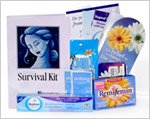Eat Your Fruit and Vegetable…Extracts
As a menopause specialist, I am often asked to review natural supplements. There are plenty of natural options available so I can understand the difficulty one may have in choosing. Most natural supplements for menopause contain either black cohosh, soy, ginseng, red clover, dong quai or their extracts. I recently learned of new supplement that didn’t contain any of these ingredients. I was intrigued and decided to learn more about it. This natural supplement called “Warmi” contains vegetable and fruit extracts, from Peru. The vegetable is believed to have been eaten by Incan women 700 years ago.
I reviewed the Warmi research. There are three clinical trials completed but not published on the product. It appears to offer the hot flash, cold sweat and mood swing relief I’ve found with better natural menopause remedies.


